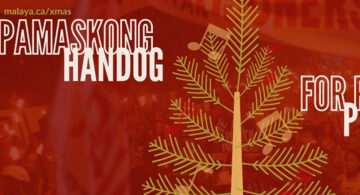
December Celebrates three major events. In addition to Christmas on December 25th, December 10th and December 18th are also days of major historical significance. December 10 is International Human Rights Day. It was on that day in 1948 when the most important document ever published by the United Nations, the Universal Declaration of Human Rights (UDHR) was proclaimed. It is the basis of many of the constitutional rights of people around the world, including the right to rebel (Preamble and strengthened by Article 2). December 18 is International Migrants Day. On that day in 1990, the United Nations Assembly adopted the International Convention on the Protection of the Rights of All Migrant Workers and Members of Their Families. It is the commitment of migrant sending and receiving countries to protect migrants, migrant workers and refugees.
What does that have to do with Christmas? To start in a biblical context, the story of the birth Jesus was highlighted in the books of Luke and Matthew. Jesus‘ parents had to flee their own land in Nazareth and take refuge in Egypt, in order to save the life of their child, Jesus. The story goes on to relay that when the people of Jerusalem asked where the newborn “King of the Jews” could be found, then King Herod the Great, the king of Judea, became paranoid that the child would challenge him for his throne. He sought to kill Jesus (Matthew 2:1-8). Herod then ordered the execution of all male children aged two year and under in the hope of killing the child (Matthew 2:16-18). This led to the Son of God and his family becoming refugees.
 As Jesus got older, he was known for curing the sick and feeding the poor. The story of Jesus is a story of living a simple life, and a story of being a champion for the marginalized and abused. It’s a story of standing up to systems of dominance (the Roman Empire). It’s a story of confronting unjust structures. Reflecting on the current times, His is the story of a true activist. Jesus was vilified and, in the end, died on the cross for what he believed in. He fought back against those who wished to silence him and stop his work for the poor. To be a good Christian is to emulate the life Jesus the Messiah led, regardless of the risks and dangers.
As Jesus got older, he was known for curing the sick and feeding the poor. The story of Jesus is a story of living a simple life, and a story of being a champion for the marginalized and abused. It’s a story of standing up to systems of dominance (the Roman Empire). It’s a story of confronting unjust structures. Reflecting on the current times, His is the story of a true activist. Jesus was vilified and, in the end, died on the cross for what he believed in. He fought back against those who wished to silence him and stop his work for the poor. To be a good Christian is to emulate the life Jesus the Messiah led, regardless of the risks and dangers.
In the last couple of weeks, active members of my organization, Migrante Alberta, were bullied online by supposed supporters of Philippine President Rodrigo Duterte. This occurrence is not so different from when I was bullied for airing grievances online a year ago. A group of rabid individuals attempted and failed to silence us and our members. In my last article for this year, I decided to share the statement of my organization on the issue.
Lastly, despite the health crisis that the world is currently facing, I wish all AFJ readers and supporters, as well as the tireless AFJ writers and publishing team a safe, Covid-free holiday season. May the spirit of Christmas, the spirit of love, peace and justice be among us. Looking forward to a fruitful New Year for everyone.
Red-taggers show rottenness against Migrante Alberta (Statement on the attempted redtagging)
Redtaggers have shown their rotting fangs to discredit and bully members of Migrante Alberta. The origin of the despicable act can be traced back to peddlers of anti-communist campaigns in the Philippines. Redtagging in the Philippines implies that individuals or organizations critical of the government are seemingly connected to communism or terrorism or both, regardless of the person’s political belief or affiliation. Redtagging has a damaging effect on its targets.
Despite the allegations devoid of proof, Migrante Alberta positions itself to defend the rights of its members and officials – that is, the right to serve the Filipino people who were forced to seek greener pastures abroad because of the same reasons the armed struggle trudges on – poverty, landlessness, corruption and various forms of socio-economic injustices that still grip the majority of the Filipino people.
A certain Roque Lito and Rosadino Roque Elizabeth have recently redtagged the group, alleging that it aims to destroy the government instead of supporting it. The malicious redbaiting went on to cyber-attack Cynthia Palmaria, Migrante Alberta’s finance officer, in the form of sexual threats.
“I joined Migrante because of its track-record as a true servant of the Filipino people. Our activities throughout the years will speak for our organization and its members’ reputation as indefatigable defenders of our people’s rights and welfare,” said Palmaria.
Migrante reiterates what activists from progressive groups such as Bayan and Makabayan have repeatedly said about red-tagging – what makes it dangerous is it provides justification for gross human rights violations. A person critical of the government can now be subjected to harassment, surveillance or even extra-judicial killings. Activists like Palmaria, can be vilified on social media, for their beliefs.
Asked about what he thought of the redtagging of Migrante Alberta, Marco Luciano, the Director of the organization said “I’m upset that our members were cyberbullied. Cyberbullying is a crime in Alberta and has legal consequences. But redtagging or redbaiting is not new. This has been happening in different regimes. Harassment of critics of the Duterte government in the age of social media is different but has the same dangerous effects”. As for the alleged connection with the CPP-NPA Luciano said “they are rebels in the Philippines fighting for what they believe in. We’re in Alberta fighting for the rights of our kababayans. That is easy to understand right?”
Migrante Alberta has been advocating for the rights of migrants since 2013. The organization kickstarted a campaign to have a career consul general in Alberta in its formation. Migrante was a key figure for the installation of the Philippine Consulate Office in Calgary in 2015. Thousands of kababayans have been benefitting from that. In 2016, they also campaigned for the rights of Canadian-born children of undocumented moms who cannot access health care because of the (non)status of their mothers. It was another victorious campaign that is now being used by many of these children of different nationalities. In 2018, Migrante Alberta once again gathered and united the Filipino community to have June designated as Philippine Heritage Month in the Province of Alberta. This was another successful campaign and lobbying effort to recognize the economic and cultural contributions of Filipinos in the province. These are only some of the accomplishments of Migrante Alberta.
So why doesn’t Migrante condemn CPP-NPA if they are not part of it so that people will not think they are? Luciano responded “the legitimacy and quality of work that Migrante Alberta does here in the Province and in Canada will not be determined whether we condemn the CPP-NPA or not. That is not our job, and no one will tell us how to do our job except our members and the people that we serve. Perhaps these people who have been red tagging Migrante and other activist groups should ask themselves why is there rebellion in the country that has continued to grow in the last 50 years. Perhaps it will also resolve the question of why they left, and why many other Filipinos kept leaving their families behind to work abroad.”
Redtagging progressive groups also serves to distract the attention of the Filipino people from issues the Philippine government has so far failed to adequately address, such as the mishandling of the government response to COVID-19, and of late, the next-to-nil response to typhoon-ravaged areas affected by the super-typhoons Rolly and Ulysses.
Migrante Alberta, along with Migrante Canada on the other hand, revived Sagip Migrante, a fundraising campaign for the victims of the super typhoons and sent over P128,000 to date and continues to raise funds for those affected by the calamity. In Alberta, the organization intensified its pro-people services, acknowledging the ill-effects the pandemic has on poor immigrant communities. The Kapitbisig national project against Covid-19 and its local Serve The People brigades in the cities of Calgary and Edmonton have benefitted tens of families of different nationalities and undocumented migrants through deliveries of food hampers and workshops addressing issues of mental health.
“We will not stop doing what we’re doing because we’re doing it for our people. Cyberbullying and sexism against my colleagues must be condemned. These redtaggers, the blind supporters of the regime only exposed themselves and the violent and misogynistic nature of the government they are supporting,” said Nellie Alcaraz, Migrante Alberta’s Calgary Organizer. “Activism and community work are not terrorism nor are they crimes,” Alcaraz added.






